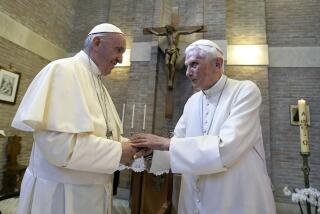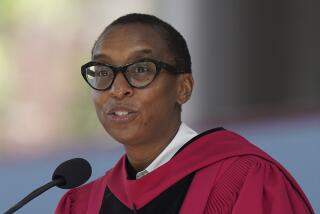Says God Is Relegated to the Incomprehensible : Cardinal Attacks Biblical Scholarship
- Share via
NEW YORK — The Vatican’s top overseer of Catholic doctrine Wednesday made a sweeping attack on biblical scholarship, saying that it has “completely relegated God to the incomprehensible.”
In a rare U.S. lecture appearance, Cardinal Joseph Ratzinger accused the majority of contemporary biblical interpreters of depicting the historical Jesus as a non-Messianic, non-apocalyptic prophet “who really proclaims nothing of significance” and whose miracles must be explained away.
Urging a complete reappraisal of what he said has often become “academic dogmas,” the head of the Vatican’s Congregation for the Doctrine of the Faith charged that biblical scholars make the “false claim” that their historical-critical methods amount to an exact science. Despite “many great achievements,” biblical studies have produced “great errors,” the cardinal said.
Theologians Disciplined
Ratzinger’s investigative office, with the support of Pope John Paul II, in recent years has disciplined a number of Catholic theologians and defined deviations from church teachings--though not without stirring debate and dissent.
His lecture was interrupted for three minutes by shouting gay and lesbian protesters who denounced Ratzinger’s 1986 statement condemning homosexual behavior. As police removed a half-dozen protesters, the soft-spoken cardinal said, “We heard what you have to say, now hear what I have to say.”
His lengthy critique of biblical scholarship did not single out any offenders, but it prompted disagreement from scholars. Several interviewed said that Ratzinger’s appraisal is outdated, describing a situation that prevailed a quarter of a century or more ago.
Ratzinger, who is 60 and a former university professor in West Germany, focused in his lecture on the work of the late German scholars Rudolph Bultmann and Martin Dibelius--Protestants whose influence was greatest before and after World War II.
To those scholars, “What otherwise might seem to be a direct proclamation of the divine, can only be myth,” Ratzinger said. “It is with this basic conviction that Bultmann, with the majority of modern exegetes (biblical interpreters), read the Bible. He is certain that it cannot be the way it is depicted in the Bible, and he looks for methods to prove the way it really had to be. To that extent, there lies in modern exegesis a reduction of history into philosophy, a revision of history by means of philosophy. . . .”
Further Criticism
Such biblical interpretation “completely relegated God to the incomprehensible . . . in order to treat the biblical text itself as an entirely worldly reality according to natural science methods,” Ratzinger said.
But Pheme Perkins, a New Testament scholar at Jesuit-related Boston College, said that scholars today do not claim they are scientifically certain.
“All exegetes today are extremely conscious of both the diversity of what we come up with and the fact that we are really talking about probabilities. The whole dispute to reconstruct the Jesus movement runs the gamut from Jesus as a wisdom teacher to Jesus as a political reformer,” Perkins said in a telephone interview.
In fact, the most commonly heard complaint against biblical research is that it introduces too many ambiguities and different interpretations, said Father Raymond E. Brown, a leading U.S. Catholic scholar who teaches at Union Theological Seminary here.
“Historical criticism shows that the (gospel writers) were not merely literal reporters of the words of Jesus and at times went beyond him both in wording and meaning. That does not lessen the authority of the Gospels,” Brown said. Recognition of the ambiguity of the biblical picture is important, he said, “even if that upsets the proponents of causes and the practitioners of dogmatism” who try to cite the Bible for support.
Brown’s remarks are in a paper he will give today in a three-day Catholic-Lutheran conference that was opened by Ratzinger’s address. The sponsor is the Center on Religion and Society, a culturally conservative research and education institute.
Seen as a Plea
Lutheran minister Richard John Neuhaus, the director of the center, noted that Brown’s paper is “dramatically different” from Ratzinger’s. Neuhaus said he thought that Ratzinger “was not laying out new rules” but was making a plea for scholars, whose work is largely technical, “to bring the Bible and the faith communities back into conversation with each other.”
Brown said that biblical research by Catholic scholars has already aided ecumenical and interfaith relations. He implied that church leaders have not taken biblical research seriously yet. “Put at the service of the churches, (the studies) can be a major element in forcing church theology (not simply individual theologians) to come to grips with factors that should bring greater nuance and maturity,” he said in his paper.
Ratzinger, however, called for “a new and thorough reflection” on the historical-critical methods developed in the last 150 years and only sanctioned in the Catholic Church for about 40 years. He said the church cannot adopt a literal reading of the Bible but must incorporate the understanding of the early church “fathers” and medieval thinkers. “Finally,” he said, “the exegete must realize that he does not stand in some neutral area, above or outside history and the church.”
Ratzinger dismissed Bible interpretations by “radical” feminist and liberation theologians:
“Whatever else may be said about them, (they) do not even claim to be in understanding of the text itself in the manner in which it was originally intended. . . . They are no longer interested in ascertaining the truth, but only in whatever will serve their own particular agendas.”
Catholic feminist scholar Elisabeth Schussler Fiorenza, informed of the remarks by Ratzinger, said: “Such a statement is nonsense. He obviously has never read any feminist biblical interpretation.”
Will Teach at Harvard
Fiorenza, a former Ratzinger student who will join the Harvard Divinity School faculty in the fall, is immediate past president of the Society of Biblical Literature, the leading professional organization of U.S. biblical scholars.
Fiorenza said in an interview that feminist scholars “are very seriously working with the text, but the text has a quite different intent than usually interpreted.”
Feminists scholars say male interpretation of male-written texts has missed passages and context important to women. Liberation theologians stress the frequent Bible themes of justice and compassion.
Ratzinger has actively enforced the Vatican’s move to reassert traditional teachings. Among his actions, Ratzinger removed Father Charles Curran’s license to teach as a moral theologian at Catholic University of America in 1986.
More to Read
Sign up for Essential California
The most important California stories and recommendations in your inbox every morning.
You may occasionally receive promotional content from the Los Angeles Times.












